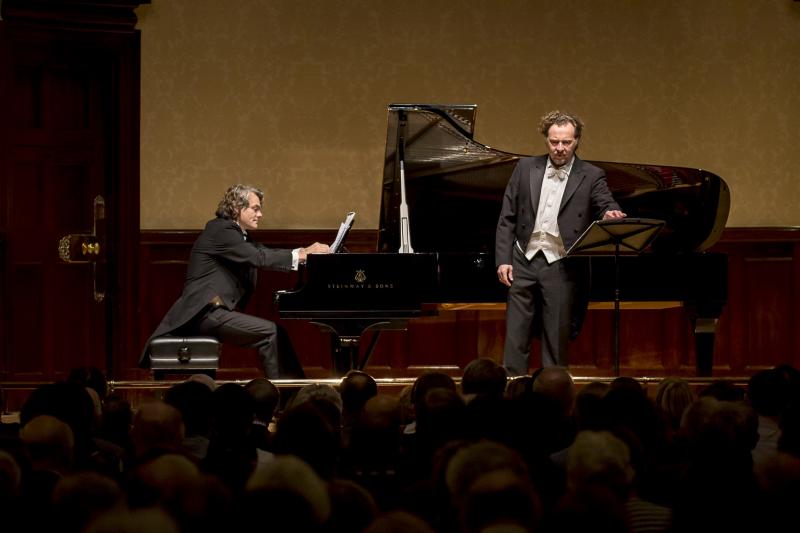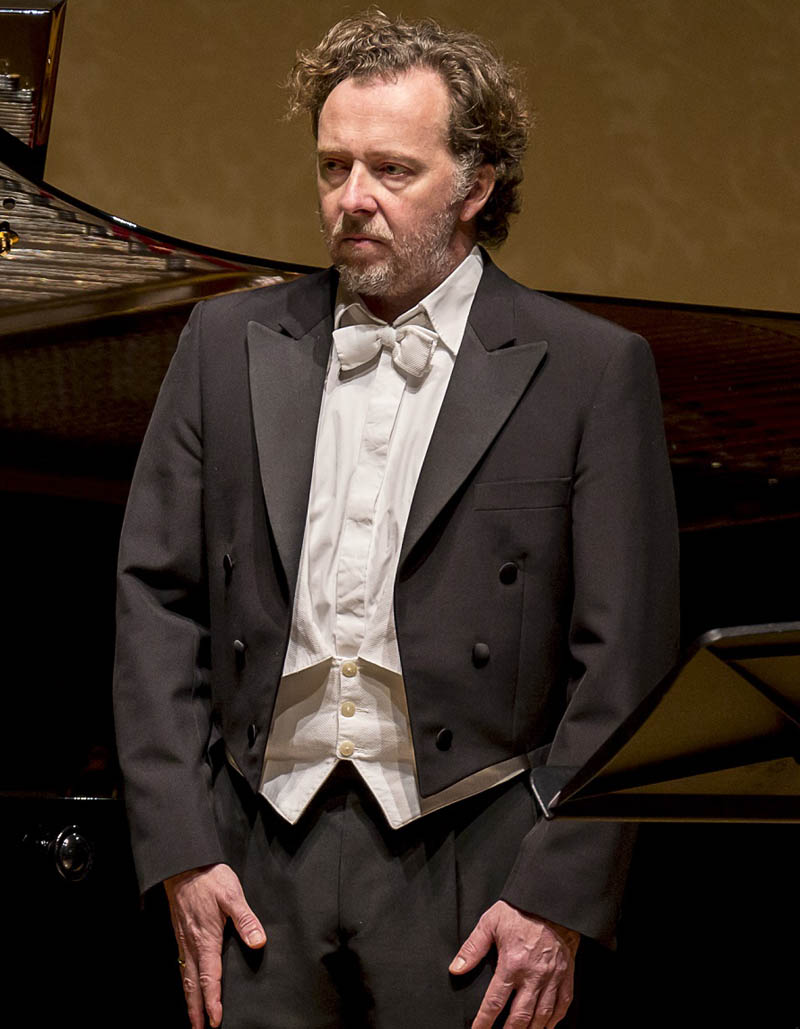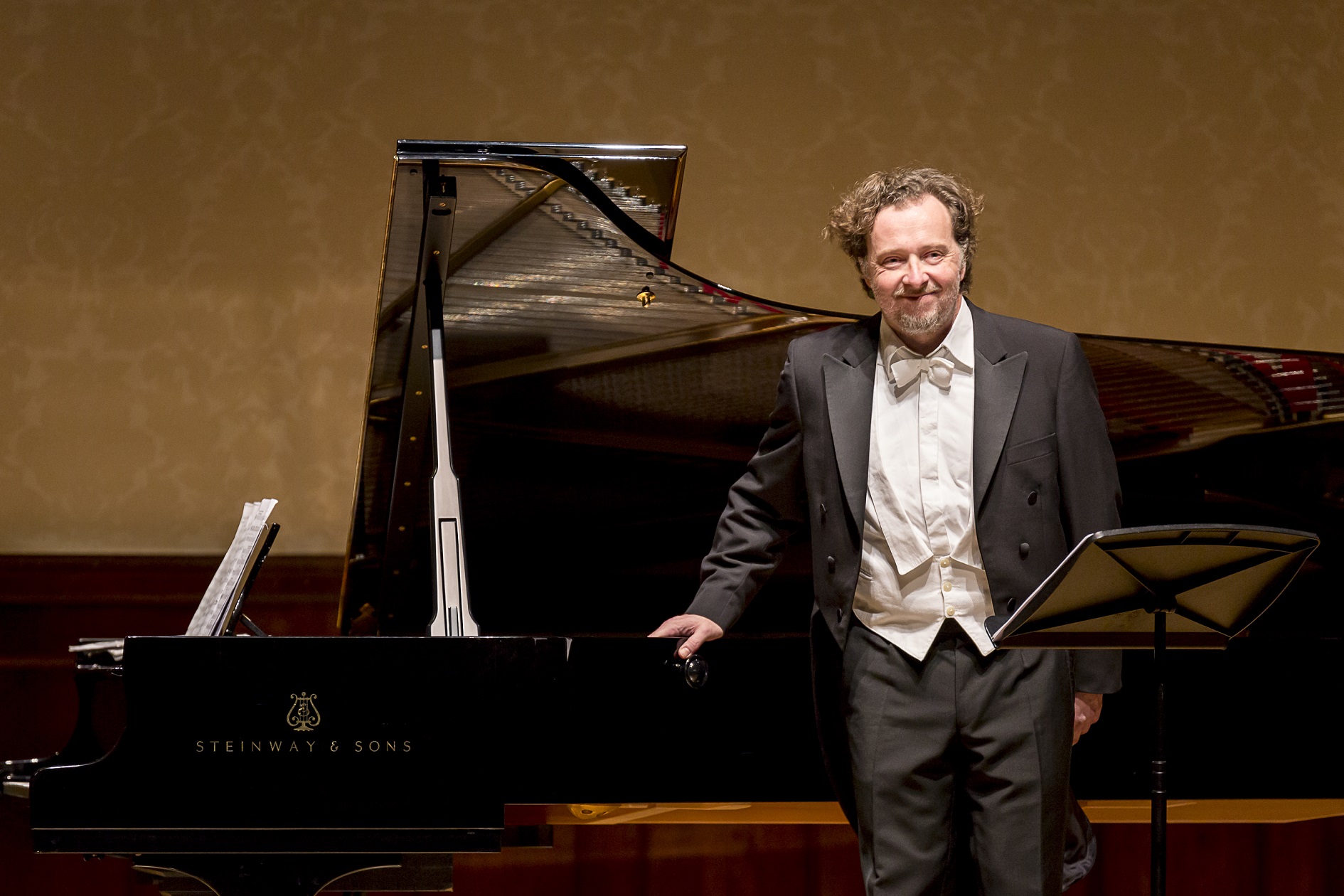Gerhaher, Huber, Wigmore Hall | reviews, news & interviews
Gerhaher, Huber, Wigmore Hall
Gerhaher, Huber, Wigmore Hall
Adventurous programme reveals broad range of the German baritone’s talents

Christian Gerhaher is a classy recitalist. His stage manner is debonair, his tailoring immaculate (although his hair can be unruly). His artistry focuses on key vocal virtues: directness of expression and beauty of tone. In this evening’s recital, an adventurous programme that switched between the Classical era and the Modern, that proved as valuable a combination in Schoenberg as it did in Beethoven.
There is a husky quality to Gerhaher’s voice, an attractive burr that appears around mezzo-forte and defines all of the louder music that he sings. It is less apparent in quiet music, but even here he is still distinctive, as much for his approach as for his tone. In quiet entries it sometimes seems that his intonation is less secure than it actually is. A deliberate tease, but an indication that he never rests on certainties. Quiet dynamics can always go lower, and he’s often prepared to take his voice to the bare limit of audibility.
 That daring was clear in the opening of the Beethoven cycle An die ferne Geliebte, which opened the programme. For a moment it seemed that Gerhaher’s voice was completely lost in the piano accompaniment, until the ear tuned in and located it in the middle of the texture. In all of the Classical-era works on the programme – Beethoven and Haydn – Gerhaher and pianist Gerold Huber took risks with extreme dynamics. But stylistically, they remained very much in the 18th century, thanks to disciplined, stately tempos and subtly shaped phrases. The performers seemed at pains to emphasise how Beethoven’s songs fit together as a cycle, gradually increasing in intensity up to the thunderous sixth song. The point was made, perhaps a little too emphatically.
That daring was clear in the opening of the Beethoven cycle An die ferne Geliebte, which opened the programme. For a moment it seemed that Gerhaher’s voice was completely lost in the piano accompaniment, until the ear tuned in and located it in the middle of the texture. In all of the Classical-era works on the programme – Beethoven and Haydn – Gerhaher and pianist Gerold Huber took risks with extreme dynamics. But stylistically, they remained very much in the 18th century, thanks to disciplined, stately tempos and subtly shaped phrases. The performers seemed at pains to emphasise how Beethoven’s songs fit together as a cycle, gradually increasing in intensity up to the thunderous sixth song. The point was made, perhaps a little too emphatically.
So too with Schoenberg’s Das Buch der hängenden Gärten. The programme came with a supplement, an article by Gerhaher himself detailing the dramatic wave described by the Stefan George texts that Schoenberg sets. This is difficult music, so any guidance was welcome. But, for all the music’s Expressionist indulgences, Gerhaher was able to rely on solid, unyielding support from Huber, presenting the complex piano accompaniments with focus of line and elegant clarity of tone. Gerhaher too took a disciplined approach to this music, taking great care to clearly enunciate each of the evocative lines. Particularly effective here were the non-cadential endings to phrases and songs, the music left hanging in the air, never demanding resolution, always comfortable with the ambiguity.
Six Haydn songs opened the second half, to English texts and dating from Haydn’s second visit to London in 1794-5. Needless to say, Gerhaher’s English diction is as immaculate as his German, and his attention to the meaning of the words just as acute. He seemed to use a different voice for the quiet music here, with more tonal definition and greater evenness of timbre. As with the Beethoven, attention to Classical decorum did not mean any lack of expression, the often broadly arched phrases drawing the ear into every line.
 Berg’s Altenberg Lieder proved the highlight of the evening. London audiences were recently disappointed when Gerhaher pulled out of a concert performance of Wozzeck, so this chance to catch up with his Berg proved a welcome recompense. And Gerhaher was born to sing Berg. That aristocratic demeanour contrasting a raw, even vulnerable, artistic persona is the ideal combination for Berg’s physiologically intense vocal writing. After the Schoenberg, Berg’s cycle seemed stylistically conservative, although it includes many surprising effects – both pianist and singer have occasion to pluck the strings inside the piano, and one of the songs ends in a disturbingly strained falsetto. But the broad expressive range of this music, and its sheer sophistication, are perfectly aligned with Gerhaher’s performance style. This was an intense experience, and one not quickly forgotten.
Berg’s Altenberg Lieder proved the highlight of the evening. London audiences were recently disappointed when Gerhaher pulled out of a concert performance of Wozzeck, so this chance to catch up with his Berg proved a welcome recompense. And Gerhaher was born to sing Berg. That aristocratic demeanour contrasting a raw, even vulnerable, artistic persona is the ideal combination for Berg’s physiologically intense vocal writing. After the Schoenberg, Berg’s cycle seemed stylistically conservative, although it includes many surprising effects – both pianist and singer have occasion to pluck the strings inside the piano, and one of the songs ends in a disturbingly strained falsetto. But the broad expressive range of this music, and its sheer sophistication, are perfectly aligned with Gerhaher’s performance style. This was an intense experience, and one not quickly forgotten.
Back down to earth with the final number, Beethoven’s Adelaide, by the standards of this evening’s eclectic programme an exceedingly well-mannered finale, but suitably robust, and convincing enough in its elegant expression to calm nerves frayed by the Berg. The encore (kindly identified by Jamie Henderson) was Mozart’s Abendempfindung, music of even greater civility but no less emotion. A perfect end to a satisfyingly diverse evening.
This recital will be broadcast on BBC Radio 3 on 9 November at 7:30 and available on the iPlayer for 30 days: http://www.bbc.co.uk/programmes/b06nrj1l
rating
Share this article
The future of Arts Journalism
You can stop theartsdesk.com closing!
We urgently need financing to survive. Our fundraising drive has thus far raised £49,000 but we need to reach £100,000 or we will be forced to close. Please contribute here: https://gofund.me/c3f6033d
And if you can forward this information to anyone who might assist, we’d be grateful.

Subscribe to theartsdesk.com
Thank you for continuing to read our work on theartsdesk.com. For unlimited access to every article in its entirety, including our archive of more than 15,000 pieces, we're asking for £5 per month or £40 per year. We feel it's a very good deal, and hope you do too.
To take a subscription now simply click here.
And if you're looking for that extra gift for a friend or family member, why not treat them to a theartsdesk.com gift subscription?
more Classical music
 BBC Proms: The Marriage of Figaro, Glyndebourne Festival review - merriment and menace
Strong Proms transfer for a robust and affecting show
BBC Proms: The Marriage of Figaro, Glyndebourne Festival review - merriment and menace
Strong Proms transfer for a robust and affecting show
 BBC Proms: Faust, Gewandhausorchester Leipzig, Nelsons review - grace, then grandeur
A great fiddler lightens a dense orchestral palette
BBC Proms: Faust, Gewandhausorchester Leipzig, Nelsons review - grace, then grandeur
A great fiddler lightens a dense orchestral palette
 BBC Proms: Jansen, Royal Concertgebouw Orchestra, Mäkelä review - confirming a phenomenon
Second Prom of a great orchestra and chief conductor in waiting never puts a foot wrong
BBC Proms: Jansen, Royal Concertgebouw Orchestra, Mäkelä review - confirming a phenomenon
Second Prom of a great orchestra and chief conductor in waiting never puts a foot wrong
 BBC Proms: Royal Concertgebouw Orchestra, Mäkelä review - defiantly introverted Mahler 5 gives food for thought
Chief Conductor in Waiting has supple, nuanced chemistry with a great orchestra
BBC Proms: Royal Concertgebouw Orchestra, Mäkelä review - defiantly introverted Mahler 5 gives food for thought
Chief Conductor in Waiting has supple, nuanced chemistry with a great orchestra
 Dunedin Consort, Butt / D’Angelo, Muñoz, Edinburgh International Festival 2025 review - tedious Handel, directionless song recital
Ho-hum 'comic' cantata, and a song recital needing more than a beautiful voice
Dunedin Consort, Butt / D’Angelo, Muñoz, Edinburgh International Festival 2025 review - tedious Handel, directionless song recital
Ho-hum 'comic' cantata, and a song recital needing more than a beautiful voice
 Classical CDs: Dungeons, microtones and psychic distress
This year's big anniversary celebrated with a pair of boxes, plus clarinets, pianos and sacred music
Classical CDs: Dungeons, microtones and psychic distress
This year's big anniversary celebrated with a pair of boxes, plus clarinets, pianos and sacred music
 BBC Proms: Liu, Philharmonia, Rouvali review - fine-tuned Tchaikovsky epic
Sounds perfectly finessed in a colourful cornucopia
BBC Proms: Liu, Philharmonia, Rouvali review - fine-tuned Tchaikovsky epic
Sounds perfectly finessed in a colourful cornucopia
 BBC Proms: Suor Angelica, LSO, Pappano review - earthly passion, heavenly grief
A Sister to remember blesses Puccini's convent tragedy
BBC Proms: Suor Angelica, LSO, Pappano review - earthly passion, heavenly grief
A Sister to remember blesses Puccini's convent tragedy
 BBC Proms: A Mass of Life, BBCSO, Elder review - a subtle guide to Delius's Nietzschean masterpiece
Mark Elder held back from blasting the audience with a wall of sound
BBC Proms: A Mass of Life, BBCSO, Elder review - a subtle guide to Delius's Nietzschean masterpiece
Mark Elder held back from blasting the audience with a wall of sound
 BBC Proms: Le Concert Spirituel, Niquet review - super-sized polyphonic rarities
Monumental works don't quite make for monumental sounds in the Royal Albert Hall
BBC Proms: Le Concert Spirituel, Niquet review - super-sized polyphonic rarities
Monumental works don't quite make for monumental sounds in the Royal Albert Hall
 Frang, Romaniw, Liverman, LSO, Pappano, Edinburgh International Festival 2025 review - sunlight, salt spray, Sea Symphony
Full force of the midday sea in the Usher Hall, thanks to the best captain at the helm
Frang, Romaniw, Liverman, LSO, Pappano, Edinburgh International Festival 2025 review - sunlight, salt spray, Sea Symphony
Full force of the midday sea in the Usher Hall, thanks to the best captain at the helm
 Elschenbroich, Grynyuk / Fibonacci Quartet, Edinburgh International Festival 2025 review - mahogany Brahms and explosive Janáček
String partnerships demonstrate brilliant listening as well as first rate playing
Elschenbroich, Grynyuk / Fibonacci Quartet, Edinburgh International Festival 2025 review - mahogany Brahms and explosive Janáček
String partnerships demonstrate brilliant listening as well as first rate playing

Add comment